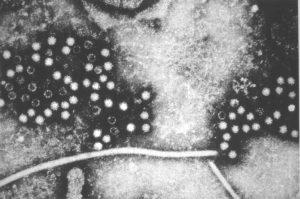Hepatitis E virus (HEV) infects approximately 20 million people annually and there is no approved diagnostic or treatment for this virus. Therefore, there is a need to understand the pathogenesis of the disease and how it evades the immune response. Researchers, led by Zongdi Feng, found that the persistence of HEV, unlike other Hepatitis viruses, is associated with the production of Type III IFN responses.
HEV is part of the family of hepatotropic RNA viruses and consists of a 7.2 kb RNA genome encoding a large polyprotein which is essential for viral replication and two other open-reading frames of proteins necessary for viral assembly and egress. It mainly infects individuals who are immuno-compromised and increases the risk of liver cirrhosis.
The mechanisms used by our immune system to fight the virus are not well understood. Hepatitis C virus has been shown to induce robust IFN-stimulated gene (ISG) expression that corresponds with poor IFN-based therapy responses. Hepatitis A virus, however, only induces limited type I IFN responses. The response triggered by HEV was not well characterized. Patients with chronic HEV have been shown to have elevated ISG expression and this was also seen in non-human primate models.
The researchers therefore investigated IFN responses induced by HEV in closer detail. To do this, they used HEpG2 human hepatoma cells and hepatocytes. The researchers found that HEV induced a sustained Type III IFN response in chronically infected cells lines. The JAK/STAT1 pathway was activated continuously and did not respond well to exogenous IFNs.
This study provides insight into the pathogenesis of the virus and how it manipulates the immune system to maintain infection. The study also provides insight into why the virus is relatively resistant to IFN therapy.
Journal article: Yin et al., 2017. Hepatitis E virus persists in the presence of a type III interferon response. PlosPathogens
Article by Thandeka Moyo












